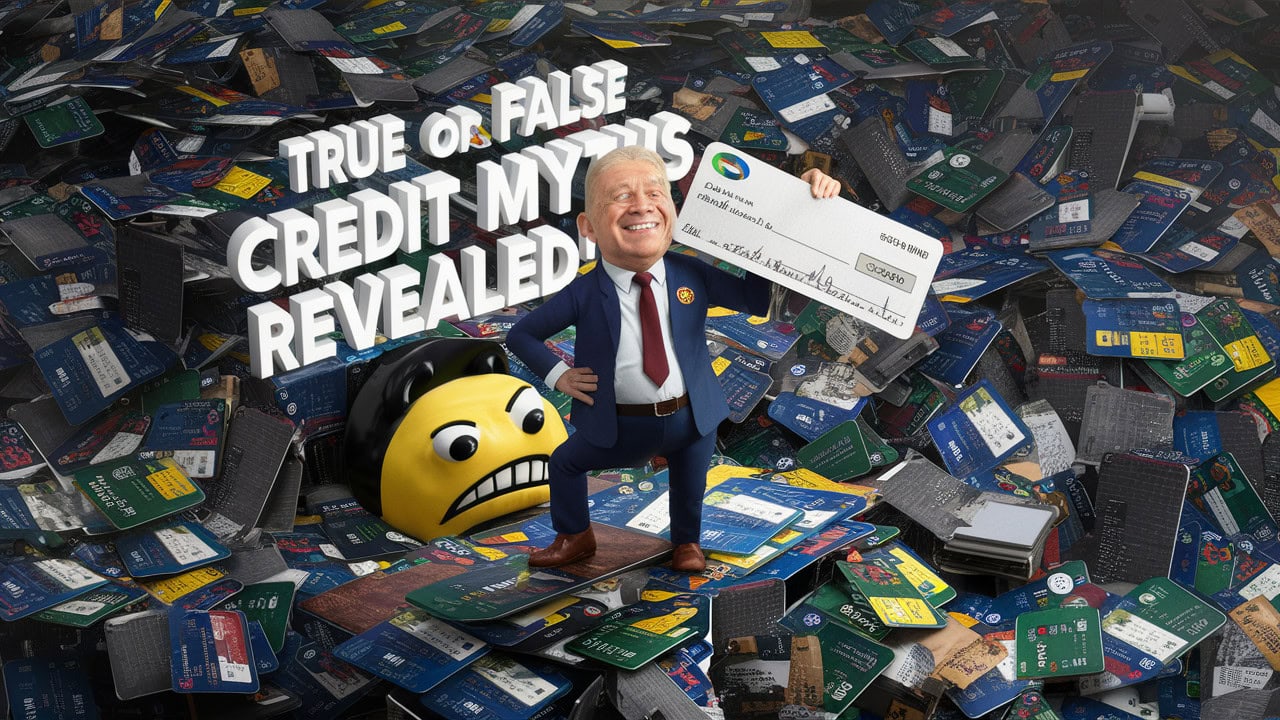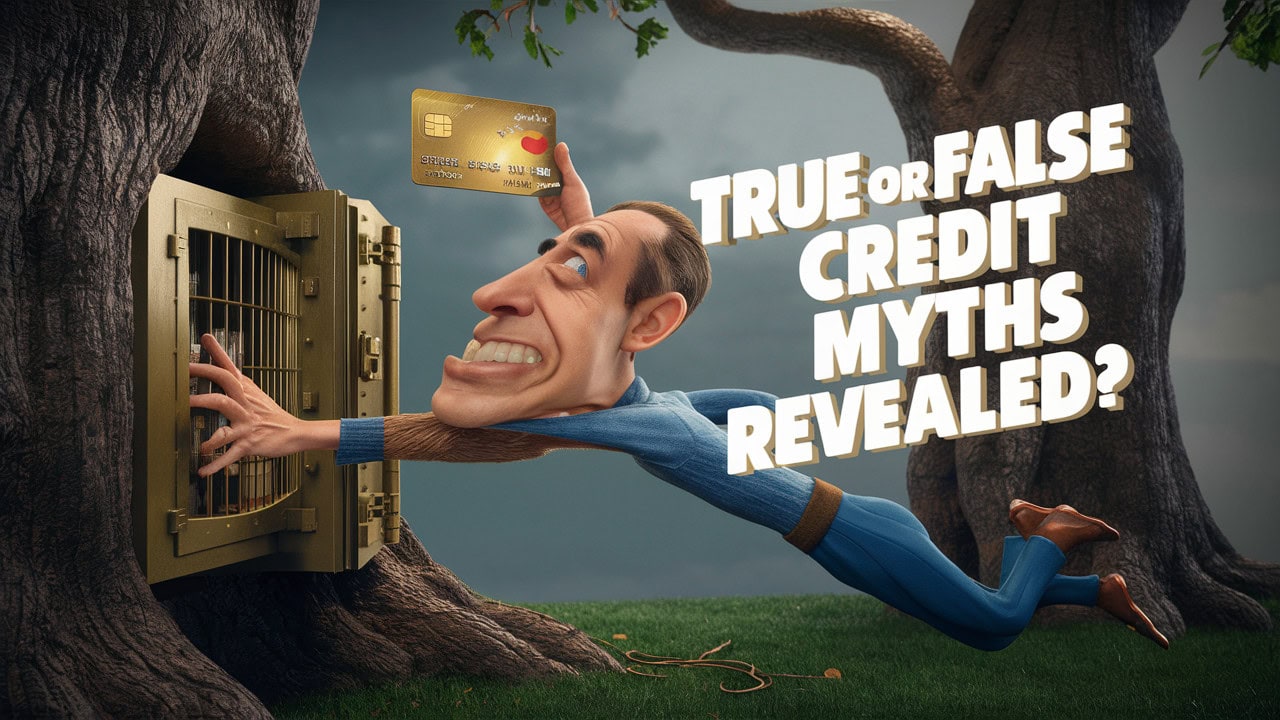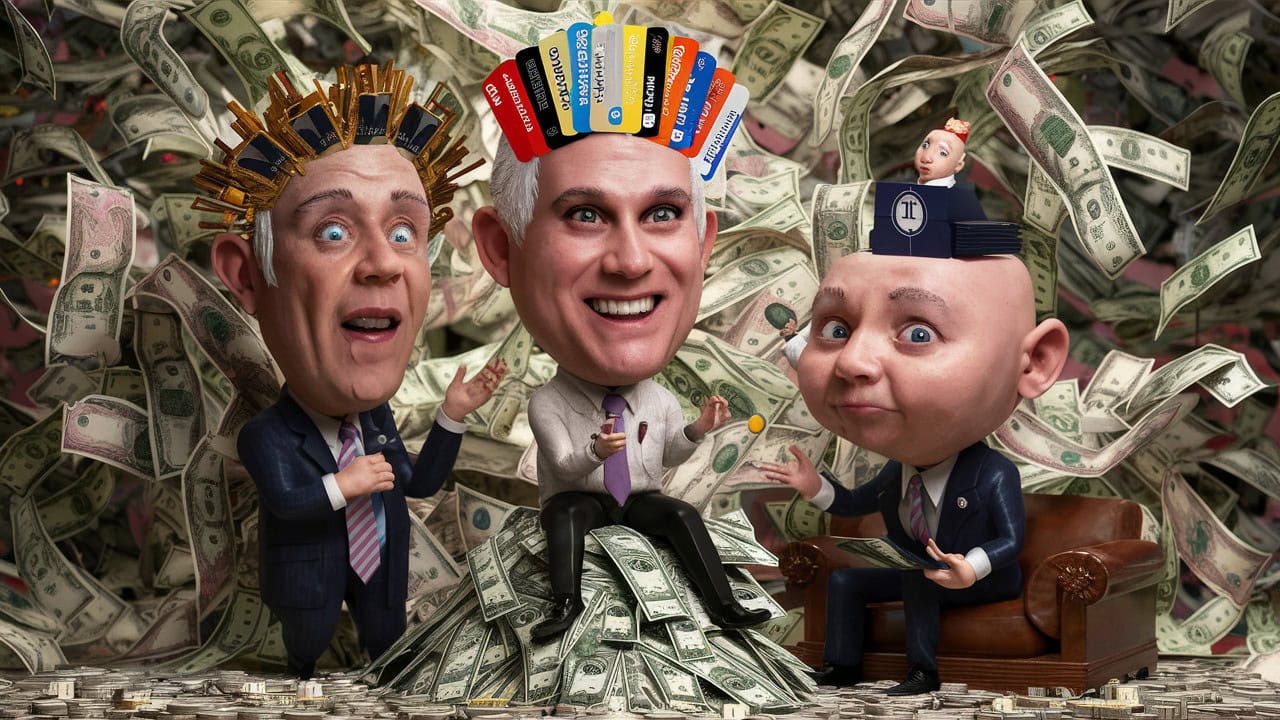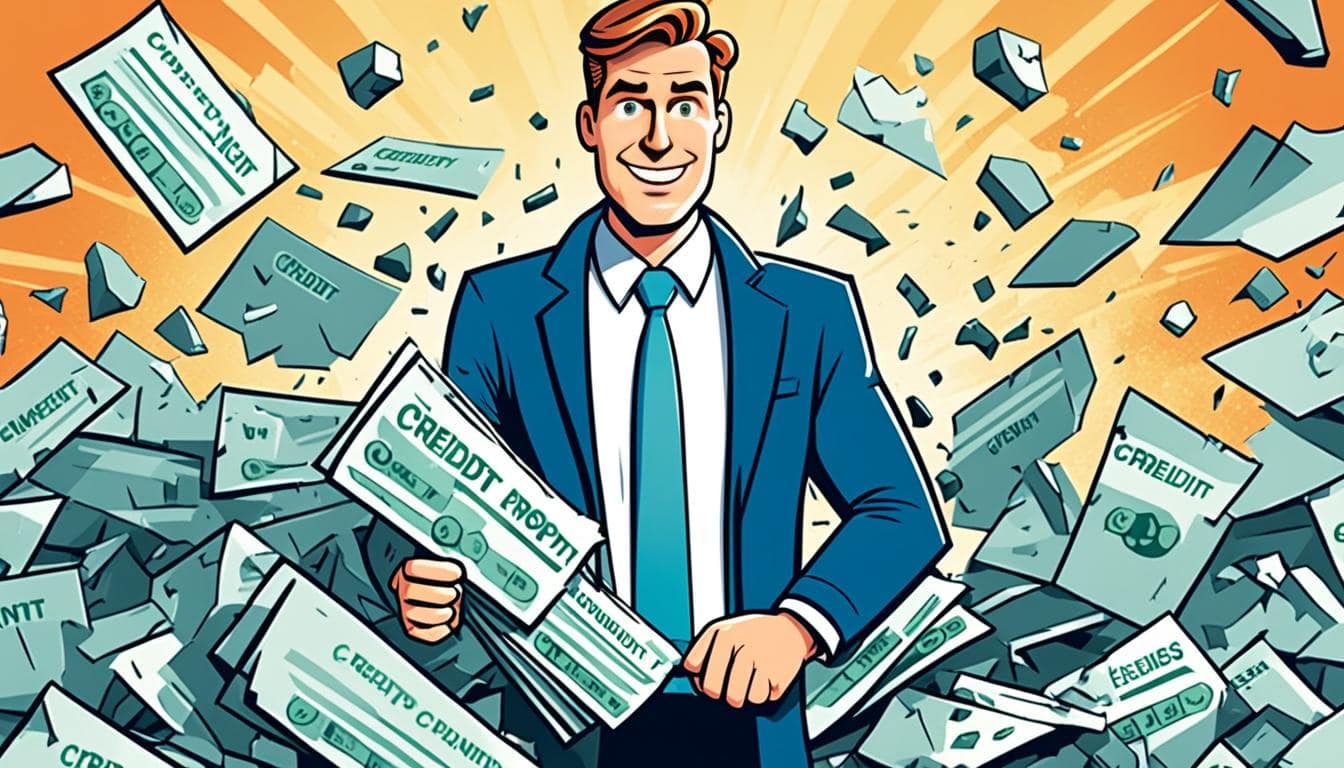Table of Contents (Click To Jump)
- 1 Common Credit Myths That Need Immediate Busting
- 2 Myth #1: Credit Cards Are Bad
- 3 Myth #2: Checking Your Credit Hurts Your Score
- 4 Myth #3: You Have to Carry a Balance
- 5 Truths About Closing Old Credit Accounts
- 6 Misconceptions About Building Credit Score
- 7 The Shocking Reality of Credit Myths and Facts
- 8 Conclusion
- 9 FAQ
Did you know almost 78% of folks in the U.S. have believed in a credit myth at some time? As someone who navigated the ups and downs of rebuilding credit post-divorce, I’ve encountered quite a few myths. From fearing a credit check would tank my score to thinking carrying a balance boosts my creditworthiness. Credit guru Merrill Chandler busted over 350 myths, changing my whole outlook. Let’s dive into the real deal about credit myths and facts and how avoiding them makes you more fundable.
Leveraging credit education, I shifted from buying into credit myths to understanding credit realities. Thanks to Merrill’s guidance, I saw how false beliefs mess up our credit game. Let’s laugh off the myths and focus on what really strengthens our credit.
Key Takeaways
- Credit myths are widespread, with 78% of Americans believing at least one.
- Checking your credit doesn’t hurt your score; it’s essential for monitoring your financial health.
- Carrying a balance is unnecessary; responsible management and timely payments are key.
- Myths can significantly impact your fundability and creditworthiness.
- Credit education is crucial in distinguishing myths from facts and building a solid credit profile.
Common Credit Myths That Need Immediate Busting
If you’ve believed in fairy tales, you know they can be misleading. The same is true for common credit myths. They’re misleading and harmful.

Myth #1: Credit Cards Are Bad
I once thought credit cards were bad. But truthfully, 77% of American adults use at least one. They’re useful for building credit scores if used correctly. Think of it as a chili-eating contest—great if managed right, harmful if not.
Myth #2: Checking Your Credit Hurts Your Score
There’s a myth that checking your score harms it. I feared checking my credit too. Yet, regular credit monitoring does not in fact lower your score. It’s crucial to monitor your report for mistakes or fraud.
Myth #3: You Have to Carry a Balance
Some think you need to carry a balance to boost your score.
FALSE!
Contrary to popular belief, paying off your balance each month is better for your score. Your debt-to-credit ratio plays a major part in your score, just as your debt-to-income does. Remember, credit balance myths can lead to unwanted debt and likely originate from a beneficiary of a debtor’s poor choices. Always use your cards wisely.
The Real Impact of High Credit Card Balances
High credit card balances can really mess up your credit profile.
TRUE!
It’s like your second cousin’s loud friend crashes your peaceful weekend. Let’s talk about why this is bad and how knowing your credit utilization can help.


Credit Utilization Ratio Explained
Alright, let’s talk credit utilization. It’s simple – think of it like how bad you gotta pee.
Your credit limit is your bladder capacity. Your balance is how full it is. Your credit utilization? Well, it’s starting to make you sweat, so you have really got to find some way to relieve it.
Here’s the deal: You want to keep your financial bladder less than 30% full. It’s like always feeling comfortable, never desperate.
If your credit limit is 100 bucks, don’t go over 30. The emptier your tank, the better your credit score looks.
Maxing out your credit? That’s like holding it in for hours. Bad idea, folks, because you will absolutely pay the price and that one is going to hurt with a sting that takes a while to subside. You feeling me?
So keep that balance low. Pay it down regularly. It’s like taking a pit stop before a long drive – smart and saves you from dancing in your seat later.
Remember, when it comes to credit, you want to feel like you just took a nice, long leak. Comfortable, relaxed, and ready for whatever comes next.
Keep it under 30%, and you’ll be golden. Literally and figuratively.
Why Paying Off Your Balance Matters
Paying off your balances is good like getting rid of guests that overstay their welcome. It stops interest from adding up, which no one likes. It’s also better for your credit score. Despite what you might hear, paying late or just the minimum is never a good idea. Here’s why:
-
- Enhances Credit Score: Clearing your balance helps keep your credit use low and scores high.
- Prevents Long-term Financial Hitches: Being late or missing payments can hurt your credit for up to seven years. And bankruptcy sticks around for 10 years.
- Reduces Financial Stress: There’s nothing like the relief of having no balance. It means no more worrying about interest piling up.
Ignore those who say carrying a balance is okay. Always try to pay it off. It’s not just about avoiding interest; it’s about boosting your credit score and securing your financial future.
Truths About Closing Old Credit Accounts
The idea of closing old credit accounts sounds simple, right? But it’s not as easy as we wish. Closing these accounts isn’t straight to the point, much like my five-year divorce. It might look like a step towards fixing your finances, but there’s more to it.
Closing old accounts can mess with your credit use rate, which affects 30% of your score. When you close an account, you reduce your available credit. This makes any debt you have seem larger. This can badly affect your credit score.
Think closing an account will erase past mistakes? Think again. Negative info can stay on your credit report for 7 years. The Federal Trade Commission says one in five Americans find mistakes on their reports. So, those old errors likely won’t just vanish.
However, sometimes closing an account is the right move. It can help if those old accounts tempt you to overspend. But, closing them will lower your score at first. You must decide if it’s worth the temporary hit for your financial future.
It’s important to know the truth behind these credit myth explanations. Closing old accounts may seem great, but you need to pay attention to the small print. The goal is to make choices that help your finances and credit history improve over time.
Misconceptions About Building Credit Score
There’s a big myth that says building credit is like a secret trick. Learning the basics can open your eyes, much like a twist in a TV show.
Length of Credit History
Some people believe a short credit history isn’t a problem. But that’s not true. A long and clean history shows lenders you’re trustworthy, like the hero who saves the day.
Lenders look at more than just your score. They also consider your income, job history, and past credit actions.
Diverse Credit Profiles
Having a mix of credit types is key. It’s like having a team of star performers in a movie—each one adds value. A varied credit profile shows you’re a good bet to lenders.
Getting new credit can drop your score a bit at first. But if you handle it well, this dip won’t last long.
Income Does Not Directly Improve Credit Scores
A big salary won’t boost your credit score. Credit scores don’t care about how much money you make. They look at how you manage debt, your credit balance, and types of credit.
The real star is how you handle your finances. Those efforts shine brighter than a big paycheck.
To build great credit, ignore the myths. Pay attention to credit myth insights and credit myth solutions. That’s how you make your credit score impressive.
The Shocking Reality of Credit Myths and Facts
Let’s get real about credit myths. It’s surprising how much false info is out there. It spreads faster than a rabbit on caffeine. We need to closely look at credit myths to find the truth.
A common mistake is coming close to your credit limit. Many think it’s okay, but high credit utilization can hurt your score. This shows why we must understand credit myths.
Here are some key points to know:
- Checking your credit scores is safe. It’s good to know where you stand.
- Paying off a debt won’t remove a late payment from your report right away. They can stay for up to seven years.
- Your credit isn’t affected by who you live with. Credit reports are as private as your hidden chocolate stash.
- There is no “credit blacklist” by credit bureaus. Lenders decide on credit based on your reports.
- Your scores can vary between Equifax, Experian, and TransUnion.
- Good credit scores don’t mean automatic approval. Lenders look at more than just scores.
- Closing a paid-off card can impact your credit negatively. It affects your credit history and utilization.
General advice about credit reports doesn’t work for everyone. Merrill Chandler shows that experts often repeat myths. For true strategies, check your sources carefully. Understanding credit myths and facts is crucial for financial wisdom.
For more details, check out this guide on credit myths and facts.
Conclusion
Thinking about my own mistakes and learning about credit, here’s some wisdom mixed with humor: know what’s true and what’s not. Knowing the truth about credit helps you stay financially healthy. It helps you see clearly in a world full of wrong information. Make sure to get your free yearly credit reports from Equifax, Experian, and TransUnion. Also, know that applying for many new credit cards quickly can lower your score.
Here are some straight facts: Checking your credit (a soft inquiry) won’t hurt your score. But, closing old accounts might. Debit cards don’t affect your credit report. High balances on your credit cards can hurt your credit utilization, even if you pay them off. Paying off your monthly balance is excellent for your credit. On time student loan payments help keep your score stable, unlike the risky business of credit card debt.
All young people should watch their credit score. A huge 93% are already paying attention! You don’t have to reach a perfect 850. Just aim for 760 or more for the best financial deals. With the right strategies and good financial habits, you’ll understand credit myths better. This will prepare you to handle the changing world of credit. Starting your financial wisdom journey means laughing off and learning from myths.
FAQ
Are credit cards really bad for your credit?
Actually, this is a common myth. Credit cards, when used right, can be good for you. They can help build your credit history. But if misused, they can cause debt problems.
Does checking your credit hurt your score?
Nope, that’s a myth. Checking your credit is important and safe. It doesn’t hurt your score. This clarity can help you manage your credit better!
Do I need to carry a balance to build my credit?
Absolutely not. You don’t need to keep a balance to build credit. What’s important is using credit wisely and paying on time. Don’t fall for this myth.
What is a credit utilization ratio and why does it matter?
Your credit utilization ratio compares what you owe to your limit. It’s key to keep it low for a good score. Understanding this can keep money troubles away.
How important is paying off the balance every month?
It’s very important! Paying balances helps keep your credit use low and avoids interest. It boosts your credit health big time.
Should I close old credit accounts?
It’s not always best to close old accounts. Doing so can affect your credit ratio and history. It’s about finding the right balance for your financial health.
Does a shorter credit history affect my score?
Yes, it does. A longer credit history usually means more trustworthiness. Your credit score benefits from a longer history.
Why is having a diverse credit profile important?
A diverse credit profile shows lenders you’re reliable. It’s like a strong cast that makes your credit story better.
Does a higher income improve my credit score?
No, higher income doesn’t directly impact your scores. Your financial habits play a bigger role in credit scores than income.
Why is separating credit myths from facts so crucial?
Believing myths can lead to bad financial choices. Knowing the truth helps you build a solid financial future. Always seek reliable advice and question myths.




